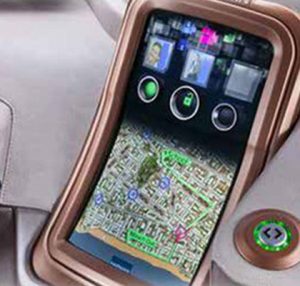In last week’s blog instalment, we covered how improving processes and using better technology in the dealership can improve customer satisfaction and retention.
For this week’s topic, we will be covering the future of vehicle technology. Technology has been growing exponentially, and this white paper excerpt looks at the exciting prospect of what dealerships will be like in the future, how technology will play a part in Fixed Operations, and how it will affect the customer experience.
“If we do go with more technologically-based electric products on cars, aside from the electric motor, it provides endless opportunity to increase connectivity and to build customer engagement and loyalty.”
Starting from Now
 Automakers are implementing varying levels of computer control systems and sensors in their vehicles, depending on vehicle grade. The trend is moving in the direction of increasing such systems and devices across all grades of vehicles. Such technology is primarily focused on vehicle mechanical performance, while in more advanced grades, consideration is given to vehicle assistance services and proximity monitoring around the vehicle.
Automakers are implementing varying levels of computer control systems and sensors in their vehicles, depending on vehicle grade. The trend is moving in the direction of increasing such systems and devices across all grades of vehicles. Such technology is primarily focused on vehicle mechanical performance, while in more advanced grades, consideration is given to vehicle assistance services and proximity monitoring around the vehicle.
In-built infotainment technology systems provide vehicle operational information to drivers, music, and SatNav, as well as integration to vehicle assistance services and personal mobile phones, PDAs, web browsing and in-car internet hotspot provisioning. Generally in-built offerings are expensive versus off-the-shelf comparisons. They often fall short on functionality, upgrades, and quickly fall out of line with customer expectations of trendy, cutting-edge technology products.
Some automakers provide mobile phone apps that allow vehicle owners some level of vehicle and automaker portal integration.
Vision of the Future
In 2020, on-board computer control systems and sensors will grow manifold in computing capacity and number. Systems will begin to have delegated decision-making authorities that can provide greater safety, comfort, and driving autonomy.
Vehicle automatic diagnosis will be a key aspect of 2020 vehicles. Always-accessible vehicle service information will allow automakers to remotely use high-capacity analytical computers and knowledge bases to predict and pre-empt service faults before they affect vehicle users. Vehicle systems will transmit performance status data and information to technicians for real-drive-time checks on vehicles, or even to the automaker Engineering department for future product planning. Third-party consumer apps will interact with vehicle systems to open new opportunities for automakers to capture and harness consumer preference and behavioural information. Automakers will better understand what drivers are doing and be able to incorporate this information into future vehicle designs and sales campaigns. Vehicle systems will be upgradable and have capability for driver personalisation.
Bridge to the Future
The transition will be made as automakers and allied industries lead the way with progressive thinking backed by strong investment in research and development. Interactive and customisable vehicles will move beyond primarily serving a transportation function, to providing a personal support environment. This will lead to a new era of brand interest, dealership trust, and higher economic returns.

Increased computerisation of vehicles will lead to new issues with safety and operational maintenance, with bugs and viruses creating potential safety threats. This will be overcome with defence-grade detection and mediation. Customers will rely on automakers and dealerships because they will trust them to provide genuine system management, updates, and repairs.
The future will be bridged by automaker and third-party I.T. providers that invest the development capital required to move quickly to back visionary and skilful innovation.
